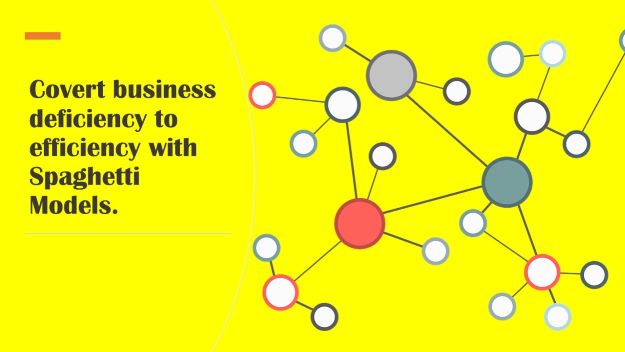Spaghetti model is a method of viewing data to visualize processes in order to identify redundancies in workflows and increase business efficiency.
Spaghetti models are also known as Spaghetti diagram, Spaghetti charts or Spaghetti plots.
How do Spaghetti model work?
Since delays and deferral type of deficiencies are omnipresent, Spaghetti model may be used to improve all types of workplaces be it a manufacturing set-up, service sector, government office, educational institute, non-profit organization etc.
However, Spaghetti models are popularly used on production shop floors of manufacturing companies, healthcare, aviation, weather bureaus, meteorology, pharmaceuticals, supply chain logistic companies, retail, hospitality, financial institutions etc.
Examples of Spaghetti model in various sectors:
Manufacturing sector-
In manufacturing sector, Spaghetti models are used to track routing of man- material movement at the shop floor. Say for example- calculating distance travelled by a forklift with the objective of improving speed with which materials are transported.
Spaghetti models can be used in all types of manufacturing companies regardless of its size, vertical or product range.
Process improvements resulting after Spaghetti model implementation in the manufacturing sector have resulted in a decrease of 30 to 35% overhead cost. Also, as much as 85% set-up time has been reduced. |
Spaghetti models used in drug discovery and drug product development research speed-up phases 1,2 and 3 of new product development pathway. They also play a pivotal role in identifying drug interactions. Identification of differences in plasma-half lives of drugs in different population groups in a clinical trial can effectively be done using Spaghetti models.
Services sector-
In services sector and office areas, the administration departments benefit the most by implementing Spaghetti models.
Productivity rise of 35 to 40% has been noted in various service-based companies after Spaghetti model led process improvements. |
Restaurant kitchen use Spaghetti models to improve chef’s efficiency to deliver on orders taken.
Package delivery and logistics companies use Spaghetti models to improve on-time delivery of letters and parcels.
Weather bureaus use Spaghetti models to study positions and intensities of pressure systems to forecast rainfall or snowstorm warnings.
Also, Spaghetti models are useful to study fish, animal and bird distribution and migration patterns.
Traditionally Spaghetti models are drawn using color pens on paper. However, now they can be done via digital means too.
Further, Spaghetti models are an integral component of business transformation and continuous improvement campaigns done via process stapling and Gemba walks.
Because of its versatility of use and fast returns on implementation, Spaghetti model is amongst the top 25 important continuous improvement tools. |
5 Signs your organizations must use Spaghetti model-
- Shorten scale-up time or the time taken to transfer technology know-how from R&D bench to commercial manufacturing.
- Reduce backorders.
- Planning a new layout or renovating your manufacturing facility or office premises.
- Improve your supply chain processes.
- Increase your business’s operating efficiency.
The success of a Spaghetti model led process improvement is confirmed when the new process does not look like ‘spaghetti’ and the total distance of process path as well as operational time are reduced drastically.
Hence, make sure to include Spaghetti model at the time of strategy planning to achieve assured returns on your business transformation or continuous improvement projects.
Related reading:
#spaghettimodel #spaghettidiagram #spaghettichart #spaghettiplot #continuousimprovement #businessturnaroud





















